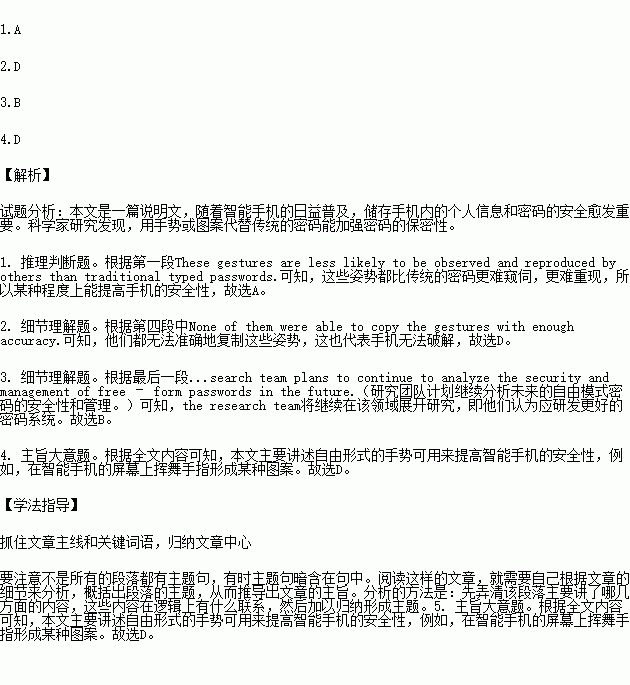题目内容
As more people use smart phones to pay bills and store personal information, strict password security has become more important than ever. A new study shows that free-form gestures–sweeping fingers in shapes across the screen of a smart phone—can be used to unlock phones. These gestures are less likely to be observed and reproduced by others than traditional typed passwords.
“All that it takes to steal a password is a quick eye,” said one of the researchers of the study. “With all the personal information we have on our phones today, improving their security is becoming increasingly necessary.” In developing a secure solution to this problem, the researchers studied the practicality of using free-form gestures. With the ability to create any shape in any size and location on the screen, the gestures were popular as passwords. Since users create them without following a template, the researchers predicted these gestures would allow for greater complexity.
The researchers carried out a create-test-retest experiment where 63 people were asked to create a gesture, recall it, and recall it again 10 days later. The gestures were captured on a recognizer system designed by the team. Using this data, they tested the complexity and accuracy of each gesture using information theory. The result of their analysis is that people are favorable to use free-form gestures as passwords.
To put their analysis into practice, the researchers then had seven students in computer science and engineering, each with considerable experience with touchscreens(触摸屏), attempt to steal a free-form gesture password by observing a phone user secretly. None of them were able to copy the gestures with enough accuracy. The gestures appear to be extremely powerful against attacks.
Though the testing is in its early stage and widespread adaptation of this technology is not yet clear, the research team plans to continue to analyze the security and management of free–form passwords in the future. They believe this is the first study to explore free-form gestures as passwords. They will soon publish their findings.
1.What can we learn about free-form gestures?
A. They are improving mobile security in a way.
B. Users will have to make use of simple gestures.
C. They will never be copied by others.
D. Users must move their fingers in fixed shapes.
2.The experiment in paragraph 4 is to test _________ of free - form gestures.
A. templateB. applicationC. accuracyD. security
3.According to the text, the researchers think that ________.
A. it is easy to steal any password with a quick eye
B. better ways of setting passwords should be developed
C. people had better not use smart phones to pay bills
D. personal information should not be stored in a phone
4.The main purpose of the text is to ________.
A. advise people to use free-form gestures
B. discuss whether smart phones are safe
C. talk about the practicality of passwords
D. introduce the study of a new password

